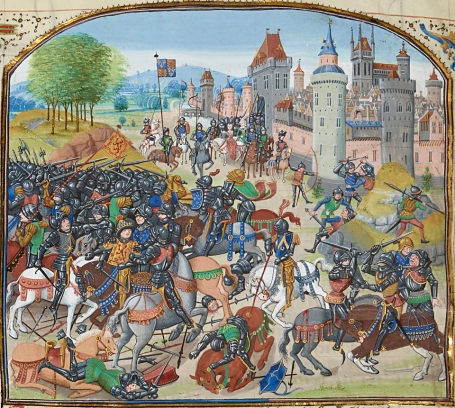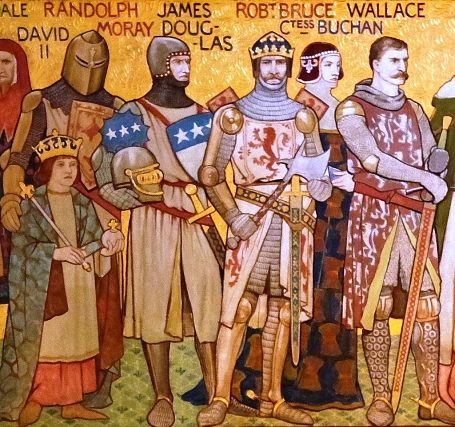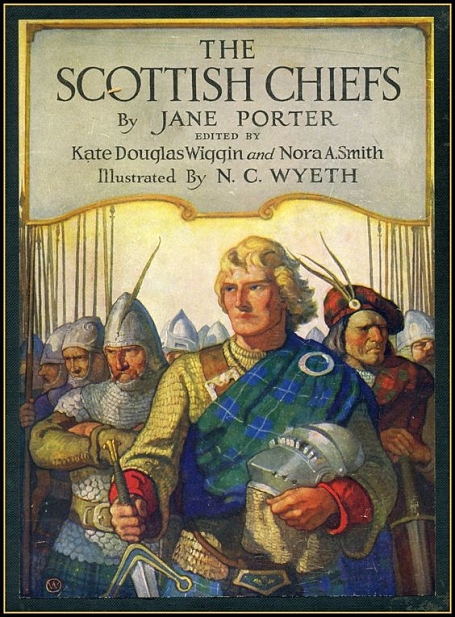The Life and Heroick Actions of the Renoun'd Sir William Wallace,
General and Governour of Scotland
by William Hamilton of Gilbertfield
Book VII, Chapter I (Continued)
How WALLACE burn't the Barns of Ayr, put Bishop Beik out of Glasgow, and killed Lord Peircy
When Wallace Men together all were met
"Good Friends," he said, "you know an Air was set;
That Clydesdale Men to Glasgow should repair
To Bishop Beik and the Lord Piercy there.
We'll thither haste therefore, tho' we be few,
Of our good Kin some killed are e'er now."
The Burgessess he caus'd unto him call,
And gave Command in gen'ral to them all;
Safely to watch, and guard the House of Ayr,
With outmost Caution, Diligence, and Care.
To which they all consented and did say,
With cheerful Heart they'd his Command obey.
Wallace, his Men, refresh't themselves and so,
For Glasgow Town prepar'd in Haste to go.
Choice of good English Horses to their Mind,
They took along, and left the Bad behind.
In Haste away rides that brave Cavalry,
Three hundred Strong was the good Company;
To Glasgow Town march these good Men and true,
And pass the Bridge before the South'ron knew.
Lord Piercy soon with Diligence and Care,
His Men conveen'd all in good Order there.
Who do conclude, that it must Wallace be,
Prepare for Fight, either to doe or Die.
The Bishop Beik and Piercy upon Sight.
Led on a Thousand Men in Armour bright.
Wallace he views their Force, then back does ride
And in two Squadrons did his Horse divide.
Harnish'd his Men who were in Number few,
Then call'd on Auchinleck both stout and true.
"Uncle," he said, "e'er we these Men assaill,
Whither will ye bear up the Bishop's Tail,
Or with the foremost will ye Gallop on,
Kneel down, and take that Prelat's Bennison."
Quoth Auchinleck, "I'll not ambitious be,
Your self may take his Blessing first for me.
That is the Post of Honour, and your Right,
I shall bear up his Tail with all my Might."
"Since we must part, you'll be much in the Wrong,"
Good Wallace said, "if you stay from us long.
Your Men will not regard their Number vast,
For God's Sake then march on your Squadron fast
Our Parting I would not the South'ron saw,
March you behind in thro' the North-East Raw;
Good Men of War are in Northumberland,"
Thus parted, and took other by the Hand.
Quoth Auchinleck, "We'll do the best we may,
'Twill not be right if we stay long away.
Ther's be a Reel among us speedily,
But to the Right Almighty God have Eye."
Then Adam Wallace, and good Auchinleck,
With sevenscore Men of Note and good Respect,
Brave cliver Boys, stout, able, haill and sound,
March briskly up the back side of the Toun:
Till they were fairly out of South'ron sight,
The other Squadron dress with all their Might.
Wallace and Boyd up thro' the plain Street go,
The English wond'red when they saw no moe.
An Ensign was with Beik and Piercy there,
Who boldly call'd, and challeng'd what they were.
A fierce Encounter then, and sharp, between
The Scots and English, as was ever seen
Quickly ensues, with such a dreadful Dint,
Till from their Swords the Fire flew like Flint.
The hardy Scots most manfully they fought,
And to the Ground Heaps of the South'ron brought.
Pierced their Plates with pointed Swords of Steel,
At ev'ry Blow they made them there to kneel.
The Stour like Smoak arose among them fast,
Dark'ned the Sun and to the Clouds it past.
Honour to gain each Scotsman did his best,
Tho' with great Numbers they were sadly prest.
Yet gallantly they fought and pushed on
With Sword in Hand, and charg'd the South'ron.
Lord Piercy's Men expert in War I wot,
Most fiercely sought, and flinched ne'er a Foot.
Then Adam Wallace, and good Auchinleck,
Their Duty next in truth do not neglect.
But like brave Sogers, do obey Command;
And boldly enter all with Sword in Hand.
Amidst the Contest hot, and fierce Dispute,
At which some South'ron bravely fac'd about.
Who stoutly charg'd the Scots, and very fast,
But were oblidg'd to yield their Ground at last.
This fresh Relief so eager fought and keen,
And made such slaps as never yet was seen.
'Mongst Englishmen, that to their very Will,
The Scots got room to fight and slay their fill.
Then Wallace 'mids that cruel Bloody throng,
With his good Sword that heavy was and long,
At the Lord Piercy such a stroak he drew,
Till Bone and Brain in different Places flew
Whom, when his Men perceiv'd that he was Dead,
With Bishop Beik all marched off with speed.
By the Friar Church, out thro' a Wood they throng,
But in that Forest durst not tarry long.
Thus in a Hurry all to Bothwell scour,
The Scotish Swords were sharp for to endure.
So cruel was the Skirmage and so hot,
The English left Seven Hundred on the Spot.
Wallace he follow'd with stout Men and tight,
Altho' sor foughten, marched all that Night;
Many he slew into the chase that Day.
But yet with Beik Three hundred got away:
The Traitor Vallange he escap'd also,
To all true Scots Men still a mortal Foe.
Five thousand Suthron Wallace burnt at Ayr,
At Glasgow Town Seven hundred killed there.
The South'ron chas'd to Bothwel that strong Place,
Then did return within a little Space.
Thus with Fatigue, and want of Sleep opprest,
Rode to Dundaff, and there took him some Rest.
Told good Sir John of all befel in Ayr,
Who did regrate he was not with him there.
Wallace he sojourn'd in Dundaff at Will,
Five Summer Days with Pleasure there until,
He Tidings got from good Men all forlorn,
Buchan was up, Athol, Monteith, and Lorn.
That on Argyle a furious War they make,
All for King Edward's cruel bloody Sake.
Campbel the Knight that witty was and smart,
Stay'd in Argyll in spite of Edward's Heart.
And keeped still his Heritage Lochlow,
In spite of the McFadzean's Sword and Bow.
Who 'cause he had unto King Edward Sworn
Gave him Argyll, and all the Lands of Lorn.
False John of Lorn to that Gift did accord,
Because in England he was made a Lord.
Duncan of Lorn he stood up for the Land,
Who when o'ercame by the McFadzean:
Did joyn himself to Campbel that brave Knight,
In War who was both worthy, wise, and wight.
McFadzean now with Diligence and Care,
His Five new Lordships 'bout him 'sembles there.
That Tyrant to the Land no sooner comes,
Than he packs up an Army of vile Scums:
Full Fifteen thousand cursed Rogues indeed
Of omne-gathrums after him does lead.
Many of whom he had from Ireland got,
Man, Wife, nor Child, these Monsters spared not.
Wasted the Land, where e'er they came at Will,
Nothing they knew, but burn, destroy and kill,
Into Lochlow they enter speedily,
Which when the good Knight Campbel did espy
In Craighmure three Hundred Men he puts,
And holds that Strength, in spite of all their Guts.
Then broke the Bridge that o'er they might not pass,
But thro' a Ford, that deep and narrow was,
Securely there, and safe made his Abode,
Aule, did defend him that was deep and broad.
McFadzean was on the other Side,
And there perforce obliged was to bide.
Till 'twixt a Rock and a great Water-side,
Where none but Four in Front could either march or ride,
McFadzean has a little Passage found,
Were he o'er that, he thought all was his own.
Where plenty he of Cattle for no Cost
Might get; for to maintain his savage Host.
Duncan of Lorn, unto his Travells got
In Quest of Wallace to prevent the Plot.
For speedy Succours to the Knight's Relief,
Against McFadzean, that false Traytor Thief.
Gilmichal then, a Foot-man clean and tight,
With Duncan went, to guide his Way aright.
Thus cliverly away the Couple trudg'd,
Till they came straight where the wight Wallace lodg'd.
There, they tho' wearie, all fatigu'd and faint,
Against McFadzean table their Complaint.
When Earl Malcolm, he the Tydings knew,
To Wallace hasts, with his Men stout and true.
Sir John the Graham, there does him also meet,
McFadzean's Wars so griev'd his noble Sp'rit.
Richard of Lundie came the self same Day,
Who all with Wallace boldly march away.
The ballad, The Life and Heroick Actions of the Renoun'd Sir William Wallace, General and Governour of Scotland, by William Hamilton of Gilbertfield, 1722, is in the public domain.

The Kingdom of England and the Kingdom of Scotland fought dozens of battles with each other. They fought typically over land, particularly Berwick-Upon-Tweed, and the Anglo-Scottish border frequently changed as a result. Read more at Wikipedia.

The First War of Scottish Independence was the initial chapter of engagements in a series of warring periods between English and Scottish forces lasting from the invasion by England in 1296 ... Read more at Wikipedia.

Digitized version of The Scottish Chiefs, by Jane Porter, a novelization published in 1921 by Charles Scribner's Sons, about William Wallace and the First Scottish War of Independence. Read online at archive.org.